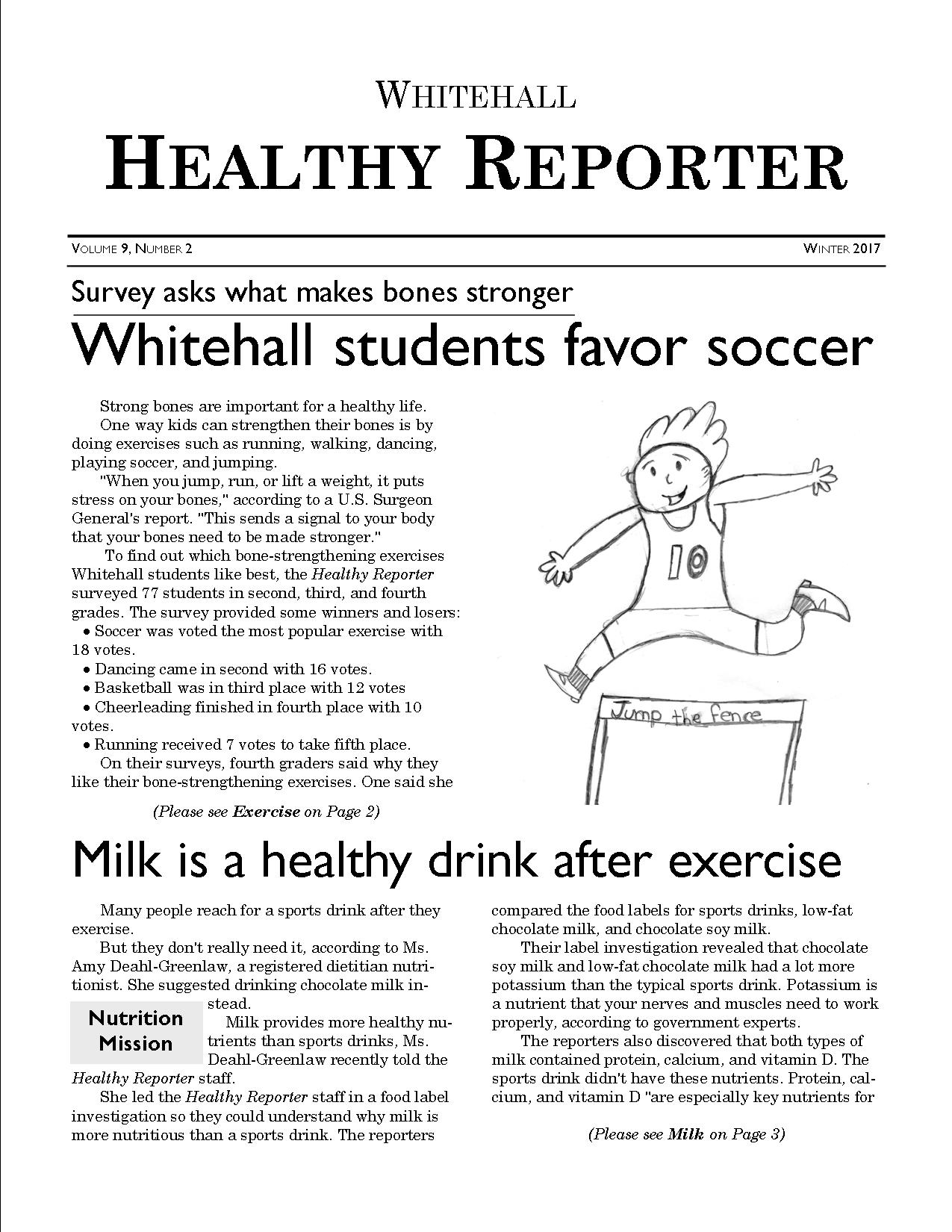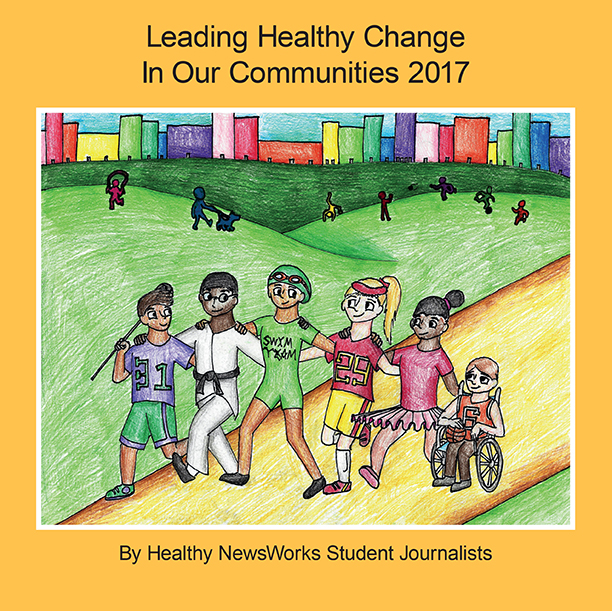
Caption: Whitehall (Elementary School) Healthy Reporter, a member of Healthy NewsWorks
Since 2003, Healthy NewsWorks has helped elementary and middle school students develop research, interviewing, writing, and critical-thinking skills that they use as reporters on school-based health newspapers. These student publications, which also include an annual book about health leaders in the Philadelphia area, provide health information and literacy enrichment for the entire school community. Our young reporters not only gain academic skills and confidence, but they become health messengers, educators, and role models. As one third grade reporter put it, "I love that I can teach people, big and small, about how to be healthy."
Healthy NewsWorks offers a unique approach to addressing two major children’s concerns that exist in many economically disadvantaged communities: significant literacy needs and serious health issues such as obesity. By tying these issues together, our reporters and readers receive a powerful instructional package that is understandable and actionable. The reporters learn that it is serious business to ferret out trustworthy information and turn it into accessible nonfiction reading material. They recognize their reporting and writing can make a positive impact on other people. In turn, their most important readers -- their fellow students -- receive a resource to enrich their literacy skills and health knowledge. Furthermore, by reading these student publications, the children in the school validate the reporters’ work. The relationship between our reporters and their readers is akin to school band members and their audience. Just as the clarinetists and drummers expect people to show up for the spring concert, we print enough copies of each school’s unique newspaper edition for every child and staff member in the participating school to receive one. "I feel like someone important to the school because I am a hard-working writer," wrote a fourth grader.
Our evaluations indicate that the reporters gain confidence as writers and expand their health understanding through working on their Healthy NewsWorks publications. Our teachers report that they would recommend our program to other schools. And nearly all of them say the program enhanced a skill or skills they use as teachers and that our program benefits the students in the broader school environment. “It has taught them [the reporters] life skills not always available in everyday curriculum,” said a fourth grade teacher who is her school’s newspaper advisor. “For example: how to work as a team, how to introduce themselves to someone professionally, the importance of paying attention to detail during an interview, and how to write a review. It has given them a great deal of respect for themselves and gratification when they see the work they've done published.”
Healthy NewsWorks started when a second grade teacher and I brainstormed ways to raise health awareness in the elementary school my daughter attended in Upper Darby, Pennsylvania. At the time, people around the nation were starting to question the quality of school lunches, the wisdom of candy sales as fundraisers, and the lack of time dedicated to physical education. We felt that a school health newspaper could offer a local lens to raise awareness of these and other health issues. To foster readership, we adhered to the journalism tenet that people like to read local news about people they know. The subjects of our stories would be the school nurse, the principal, the custodian, the third-grade teacher, or the fifth-grade safety monitor. We believed the key ingredient for readership appeal would be to staff the newspaper with student reporters.

Caption: Andrea Ritter, Healthy NewsWorks student reporter
Since that first newspaper program, Healthy NewsWorks has guided well over 1,000 student reporters in 32 schools -- nearly all in economically disadvantaged communities -- to produce more than 425 unique health newspapers. In 2012, we expanded our programming to include an annual Healthy NewsWorks book, “Leading Healthy Change In Our Communities.” Each student-written and -illustrated book focuses on a dozen leaders who are helping to create healthier communities for children and families. The leaders have included the Philadelphia police commissioner, a former Centers for Disease Control and Prevention director, the Robert Wood Johnson Foundation director, artists, doctors, hunger relief advocates, among others. As time and resources permit, we also have started developing a digital presence with videos and even our first podcast.
We have not encountered a program yet that duplicates Healthy NewsWorks’ scope. What distinguishes our program from many other literacy programs is that it focuses on purpose-driven nonfiction writing. What distinguishes it from other health programs is that it equips program participants with research and writing skills to communicate the health information. What distinguishes it from other scholastic journalism programs is that it focuses on health in primary schools, thereby instilling an understanding of how to make healthy life choices from an early age. “If learning is about discovery, who can deny that teaching students to formulate in-depth articles about health, engage in research about a specific topic, and prepare probing interview questions qualifies as first-rate education?” wrote one education leader about Healthy NewsWorks.
All of this hinges on a strong partnership with our schools, principals, and teachers. At the core of each school program are teachers -- whom we call editors. They manage the program, from scheduling weekly meetings to ensuring students complete assignments. We also ask that the program operate during the school day so students have the time and structure to be successful. Writing takes concentration and effort. Plus, our program is rooted in challenging concepts for children: How do you determine if a website is trustworthy? Why do you need to source information? Why should you choose low-fat or non-fat dairy foods? The teachers keep the reporting process on track, connect the newspaper work to their core curriculum, and serve as coaches and cheerleaders.
Healthy NewsWorks faculty members support the teachers by creating curriculum and student materials; leading classroom lessons and small group discussions as needed; arranging for interviews and reporting trips; and editing and laying out the newspapers. We look for mentors who are accomplished journalists, healthcare professionals, librarians, and other specialists. As our teachers become more experienced with the program, they need less assistance in the classroom from Healthy NewsWorks mentors.
We also have been finding ways to deepen Healthy NewsWorks’ impact in our participating schools. We offer schools special lessons on interviewing skills, nutrition education, and web-based research. This school year we are piloting a cardiovascular education program called Hearty Kids in seven Kindergarten to second grade classrooms. The objective is to involve our youngest readers in the newspaper process and to create a special newspaper section for them.
Healthy NewsWorks is at an inflection point in its evolution from a start-up program to becoming a fully integrated, independent organization that can sustain its operations. We’ve been responsible for own fundraising since 2006 when we joined a Philadelphia nonprofit to pilot the program beyond its first home in Upper Darby. Since 2010, we have operated under the fiscal sponsorship of Philadelphia-based Resources for Human Development as a member of its nonprofit incubator. In August 2017, Healthy NewsWorks received notification of tax-exempt status from the Internal Revenue Service. As of this writing, we anticipate finishing our transition to our own organization this winter.
To make Healthy NewsWorks financially possible, we have received generous support from hundreds of individual donors and more than 30 foundations. We also have received funds from organizations, businesses, and direct service fees. We are now in the midst of a three-year capacity-building program that we expect will help build our revenue base and lay a solid foundation for long-term sustainability. We also receive tremendous support from a loyal cadre of community volunteers, including the Healthy NewsWorks board of directors.
Our overarching goal over the next three years is to establish a fully integrated model that schools can implement on a self-directed basis. A self-directed program would allow more schools to tap into Healthy NewsWorks’ expertise and resources. To reach this milestone, we plan to develop a train-the-trainer program, enhance web-based learning, and further develop educational materials and lesson plans and align them with educational standards.
We will continue to directly manage a network of schools in the Philadelphia area. Being inside classrooms and working with teachers have shaped the program from the start. And we believe this collaboration will continue to energize Healthy NewsWorks and ensure that the program adapts to ever-changing school environments.
Author Bio
Marian Uhlman is executive director and cofounder of Health NewsWorks. She is a former reporter for The Philadelphia Inquirer, where she specialized in health issues.


